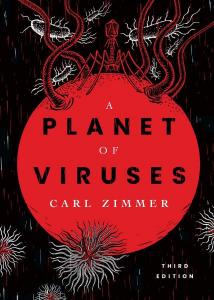
Carl Zimmer—A Planet of Viruses, Third Edition
Carl Zimmer
University of Chicago Press, April 2021, $15
ISBN-10: 022678259X, ISBN-13: 978-0226782591
Zimmer reports:
A Planet of Viruses has had a long evolution. It emerged out of a series of essays I wrote over a decade ago as part of an educational project at the University of Nebraska. For each essay, I picked a single virus to discuss, using it to explore a major theme of virology in general. For example, to talk about whether viruses can ever be eradicated, I wrote about one of the rare successes, when humanity wiped out smallpox.
By the time I was done with the essays, my collaborators and I realized that I had actually written a book. We approached the University of Chicago Press with my essays. They published A Planet of Viruses in 2011.
Three years later, we realized that the book needed an update. That’s because Ebola was sweeping across West Africa, and suddenly the world wanted to know more about viruses--how they work, where they come from, and how we can fight them. The second edition of A Planet of Viruses came out in 2015.
In 2020, Covid-19 created a new appetite for information about viruses. And so I wrote a third edition, which has just come out. The book is updated throughout, including the latest research on viruses ranging from HIV to influenza. I also added a new chapter on SARS-CoV-2.The emergency of Covid-19 can seem mystifying to people who haven’t given viruses much thought before. But in A Planet of Viruses, I placed the coronavirus in its proper context: the virosphere. Earth is home to about 10000000000000000000000000000000 viruses. They infect every cellular form of life. There are even viruses that infect other viruses. Some scientists have estimated there are over a trillion species of viruses on Earth.
The vast majority of these viruses will never pose a threat to us. They will infect bacteria, algae, coral reefs, and other species. But some--especially certain viruses that infect bats and other mammals--have the potential to spill over the species barrier and start new pandemics. Covid-19 was not the first such event, and it won’t be the last.
Contact info:
- Carl Zimmer: 917-863-0212, carl@carlzimmer.com, https://carlzimmer.com/, @carlzimmer
- Book: https://press.uchicago.edu/ucp/books/book/chicago/P/bo89967708.html
- Publicist: Nicholas Lilly, 773-702-7490, nlilly@uchicago.edu
NASW members: will your book be published soon? Promote it by submitting your report for Advance Copy.
Tell your fellow NASW members how you came up with the idea for your book, developed a proposal, found an agent and publisher, funded and conducted research, and put the book together. Include what you wish you had known before you began working on your book, or had done differently.
See https://www.nasw.org/advance-copy-submission-guidelines.
View Advance Copy archives at https://www.nasw.org/member-article/advance-copy.
Thinking of writing a book? If you are a NASW member, you may access a list of more than 200 books and online resources to help you craft your book proposal, find an agent and funding sources, negotiate your contract, learn about self-publishing, publicize and market your book, and more at https://www.nasw.org/article/write-book.
Send book info and questions about book publishing to Lynne Lamberg, NASW book editor, llamberg@nasw.org.
Follow @LynneLamberg on Twitter for news about science/medical books and writing.
Advance Copy
The path from idea to book may take myriad routes. The Advance Copy column, started in 2000 by NASW volunteer book editor Lynne Lamberg, features NASW authors telling the stories behind their books. Authors are asked to report how they got their idea, honed it into a proposal, found an agent and a publisher, funded and conducted their research, and organized their writing process. They also are asked to share what they wish they’d known when they started or would do differently next time, and what advice they can offer aspiring authors. Lamberg edits the authors’ answers to produce the Advance Copy reports.
NASW members: Will your book be published soon? Visit www.nasw.org/advance-copy-submission-guidelines for information on submitting your report.
Publication of NASW author reports in Advance Copy does not constitute NASW's endorsement of any publication or the ideas, values, or material contained within or espoused by authors or their books. We hope this column stimulates productive discussions on important topics now and in the future as both science and societies progress. We welcome your discussion in the comments section below.


